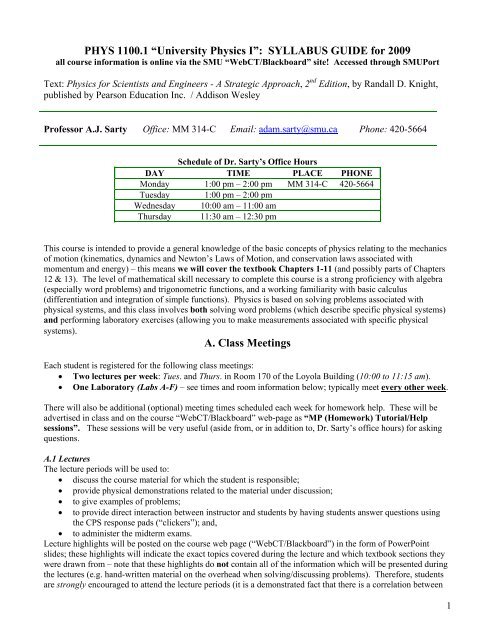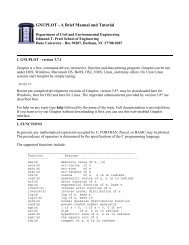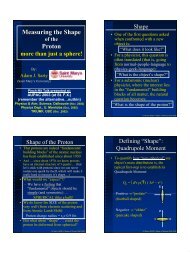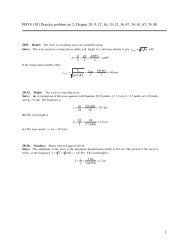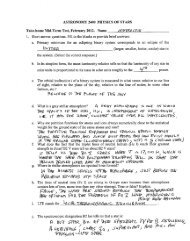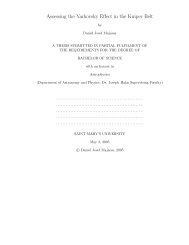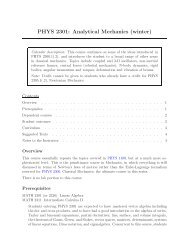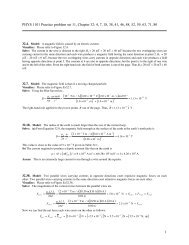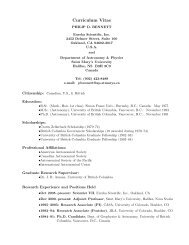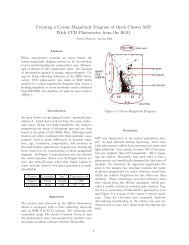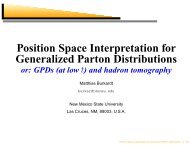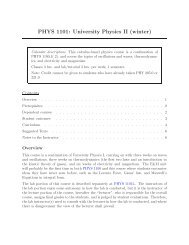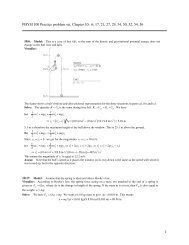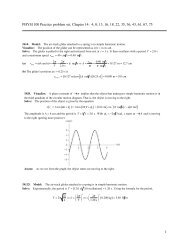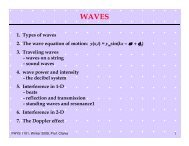PHYS 1100.1 âUniversity Physics Iâ: SYLLABUS GUIDE for 2009 A ...
PHYS 1100.1 âUniversity Physics Iâ: SYLLABUS GUIDE for 2009 A ...
PHYS 1100.1 âUniversity Physics Iâ: SYLLABUS GUIDE for 2009 A ...
Create successful ePaper yourself
Turn your PDF publications into a flip-book with our unique Google optimized e-Paper software.
<strong>PHYS</strong> <strong>1100.1</strong> “University <strong>Physics</strong> I”: <strong>SYLLABUS</strong> <strong>GUIDE</strong> <strong>for</strong> <strong>2009</strong>all course in<strong>for</strong>mation is online via the SMU “WebCT/Blackboard” site! Accessed through SMUPortText: <strong>Physics</strong> <strong>for</strong> Scientists and Engineers - A Strategic Approach, 2 nd Edition, by Randall D. Knight,published by Pearson Education Inc. / Addison WesleyProfessor A.J. Sarty Office: MM 314-C Email: adam.sarty@smu.ca Phone: 420-5664Schedule of Dr. Sarty’s Office HoursDAY TIME PLACE PHONEMonday 1:00 pm – 2:00 pm MM 314-C 420-5664Tuesday 1:00 pm – 2:00 pmWednesday 10:00 am – 11:00 amThursday 11:30 am – 12:30 pmThis course is intended to provide a general knowledge of the basic concepts of physics relating to the mechanicsof motion (kinematics, dynamics and Newton’s Laws of Motion, and conservation laws associated withmomentum and energy) – this means we will cover the textbook Chapters 1-11 (and possibly parts of Chapters12 & 13). The level of mathematical skill necessary to complete this course is a strong proficiency with algebra(especially word problems) and trigonometric functions, and a working familiarity with basic calculus(differentiation and integration of simple functions). <strong>Physics</strong> is based on solving problems associated withphysical systems, and this class involves both solving word problems (which describe specific physical systems)and per<strong>for</strong>ming laboratory exercises (allowing you to make measurements associated with specific physicalsystems).A. Class MeetingsEach student is registered <strong>for</strong> the following class meetings:• Two lectures per week: Tues. and Thurs. in Room 170 of the Loyola Building (10:00 to 11:15 am).• One Laboratory (Labs A-F) – see times and room in<strong>for</strong>mation below; typically meet every other week.There will also be additional (optional) meeting times scheduled each week <strong>for</strong> homework help. These will beadvertised in class and on the course “WebCT/Blackboard” web-page as “MP (Homework) Tutorial/Helpsessions”. These sessions will be very useful (aside from, or in addition to, Dr. Sarty’s office hours) <strong>for</strong> askingquestions.A.1 LecturesThe lecture periods will be used to:• discuss the course material <strong>for</strong> which the student is responsible;• provide physical demonstrations related to the material under discussion;• to give examples of problems;• to provide direct interaction between instructor and students by having students answer questions usingthe CPS response pads (“clickers”); and,• to administer the midterm exams.Lecture highlights will be posted on the course web page (“WebCT/Blackboard”) in the <strong>for</strong>m of PowerPointslides; these highlights will indicate the exact topics covered during the lecture and which textbook sections theywere drawn from – note that these highlights do not contain all of the in<strong>for</strong>mation which will be presented duringthe lectures (e.g. hand-written material on the overhead when solving/discussing problems). There<strong>for</strong>e, studentsare strongly encouraged to attend the lecture periods (it is a demonstrated fact that there is a correlation between1
lecture attendance and student per<strong>for</strong>mance). Note also that the lectures will be recorded (audio of Dr .Sarty), sothat the web-posting (on “WebCT/Blackboard”) of lectures will also contain a “multi-media file” link that willallow you to have a link between the PowerPoint slides shown in class and the audio of Dr. Sarty speaking duringthe lecture (this may be helpful when studying, or particularly on those rare occasions that you miss lecture!).To make the best use of the limited lecture time during the semester, discussion during lectures will be primarilydevoted to activities aimed at increasing understanding of physics concepts and solving problems; this means thatstudents will get the most out of lectures if they have read the appropriate textbook material ahead of time.A.2 Participation During Lectures – “Clickers” in the ClassroomTo enhance the active engagement of the students with the material being discussed in class, and allow a kind ofdialogue between the students and the instructor on the physics concepts under discussion, this course will use the“wireless response system” which is noiw available <strong>for</strong> use in most classrooms at SMU. In order to benefit fromthis system, students are required to purchase a “CPS” (Classroom Per<strong>for</strong>mance System) transmitter (or“clicker”) from the Bookstore which will be used during lectures – you will need to bring your CPS transmitterto lectures in order to participate and benefit from this portion of the course. A new CPS transmitter costs$24.95(+ 5% GST = $31.45), used transmitters (if available) cost $21.95(no tax) and both can be sold back to thebookstore during their “book buy-back periods” after the course (you’ll get $11.00 back). Further, yourtransmitter will need to be “registered” online at eInstruction.com so that your transmitter gets identified by meas belonging only to you. Also: bundled with your new textbook is a “clicker rebate coupon” that you can mail tothe textbook publisher <strong>for</strong> some money back (if you bought a new clicker). There is a once-per-semester fee toregister your transmitter, and you have 2 options to pay this: you can pay with a credit card online <strong>for</strong> a fee of$10.00 (US Dollars); or, you can purchase a “clicker access code” from the Bookstore <strong>for</strong> $22.50(+ 13% HST =$25.43). During lectures, between 1 and 4-6 conceptual questions will be asked, and you will answer thequestions using your transmitter. The questions will be asked once during the lecture (be<strong>for</strong>e, or as, the materialis covered), but your responses to these first questions are not saved <strong>for</strong> grading. The same questions, however,will be asked again at the end of the lecture – after the required material has been discussed – and these responseswill be saved to make up the clicker-portion of your Active Participation grade.A.3 Participation Be<strong>for</strong>e Lectures – Weekly “Reading Quizzes” on Blackboard/WebCTTo make the best use of the limited lecture time during the semester, discussion during lectures will be primarilydevoted to activities aimed at increasing understanding of physics concepts and solving problems; this means thatstudents will get the most out of lectures if they have read the appropriate textbook material ahead of time. Toencourage all students to read the textbook sections each week be<strong>for</strong>e the material is discussed in class, there willbe weekly “Reading Quizzes” that students will be required to complete on the Blackboard/WebCT coursewebsite. These Quizzes are designed to be relatively simple / straight-<strong>for</strong>ward, designed only to remind studentsof a few particular definitions and concepts in the textbook material. The Quizzes will be available on the webistea few days be<strong>for</strong>e they are due each week, with the due date/time being 15 minutes be<strong>for</strong>e lecture (<strong>for</strong> example: aQuiz may become available on a Friday, and then due at 9:45am the following Tuesday morning). Theavailability and due dates of each week’s Reading Quiz will be announced either clearly on the webpage fromweek to week. Your results from these weekly Quizzes will make up the reading-quiz portion of your ActiveParticipation grade.A.4 Laboratory MeetingsEach student is registered to attend one particular lab section (either A,B,C,D,E or F). Your lab section actuallyalternates between per<strong>for</strong>ming a laboratory one week, and leaving you free the next week (good time <strong>for</strong> MPhomework or help!). The general schedule is tabulated below, with more details on which week your sectionmeets is given separately (and posted on webpage) – more details about the labs from your Lab Instructor.LABSECTIONDAY TIME LABROOMLABINSTRUCTORA, D Mondays 2:30 – 5:30 pm MM 023 D. ClarkeB, E Tuesdays 2:30 - 5:30 pm MM 023 D. ClarkeC, F Thursdays 2:30 – 5:30 pm MM 023 J. Hurry2
The purpose of the lab sessions is to gain hands-on experience with laboratory apparatus, to develop skills inper<strong>for</strong>ming experiments, and to learn methods of analyzing scientific data, including an understanding ofexperimental uncertainty and error propagation. There will be a total of 5 labs per<strong>for</strong>med, including a “<strong>for</strong>malreport”. More details on the labs, and the grading procedure and weighting, is contained in a separate “LabSyllabus” document (available at the first lecture, and posted online at the course website). Laboratory manualswill be available in the Astronomy & <strong>Physics</strong> Student Society Room (Room MM 014A) at a <strong>for</strong> a cost of $10.00;they will be <strong>for</strong> sale between 2:00-4:00pm on Sept. 10, 11, 14, 15, and 17. PLEASE NOTE: LABS BEGINTHE WEEK OF SEPT. 14 th and there is some preparation work to be done be<strong>for</strong>e arrival – see separateLab Syllabus.A.5 Mastering<strong>Physics</strong> (“MP”) Homework HelpRoomThere will be a MP tutorial/help room (locations/times shown in table below), and will be staffed by graduatestudent Teaching Assistants (“TAs”) - names of TAs to be confirmed later. The help room should have a fewcomputers available so that you will be able to talk with the TA (and each other) while getting help withdifficulties you may be having on your computer-based MP homework. Please take advantage of the timesthe room is open to work with your fellow classmates on the homework (in addition to any extra advicefrom the TA). The MP help room will hopefully also have extra tables set up to allow people to work onproblems (alone, or with others in groups) be<strong>for</strong>e going to a computer – so this may provide a meetingpoint to <strong>for</strong>m impromptu study groups.Mastering<strong>Physics</strong> Tutorial/Help Room: Schedule & LocationsDAY TIME HELP ROOM LOCATIONMondays 1:30 – 3:30 pm Loyola (L) 188Tuesdays 3:00 – 5:00 pm McNally East (ME) 109Wednesdays 1:30 – 3:30 pm McNally Main (MM) 307AThursdays 1:30 – 3:30 pm McNally Main (MM) 307AB. Completion and Grading of the CourseThe final course grade will be calculated using the grades from the 2 Midterm Exams, the Laboratory Portion(including reports and written exam), the MP Homework problems, the Active Course Participation Portion(including the in-lecture “CPS” questions and the be<strong>for</strong>e-class Reading Quiz questions), and the DecemberExamination. Also, a small portion of the course grade will come from the writing of a “Diagnostic” test, whichis a standardized measure of your physics knowledge (this Diagnostic test involves no extra preparation or studyon your part – you will write it twice, and the credit you receive will be a “scaled-up” version of the “rawscores”…I’ll talk more about that during class). These components will be weighted in the following way.Course Grade ComponentsAreaGradeLaboratory 20 %MP Homework Assignments 14 %Active Course Participation (in-class CPS, be<strong>for</strong>e-class Reading Quiz) 5 %Diagnostic mini-test 1 %2 Midterm Exams 30 %December Exam 30 %3
C. The Course “WebCT/Blackboard” Web-PageA great deal of required in<strong>for</strong>mation will be made available at the password-protected Saint Mary’sWebCT/Blackboard web page, which can be accessed through your SMUPort login - click on the link to<strong>PHYS</strong>1100 under “My Courses”. The PowerPoint lecture slides will be available <strong>for</strong> printing from this courseweb-page, as will detailed solutions to recommended textbook problems, course announcements, ReadingQuizzes (under “Assessments”), a course Calendar, and other in<strong>for</strong>mation. A direct link to the Mastering<strong>Physics</strong>homework webpage is also available on the web-page. The goal of the course web-page <strong>for</strong> this course is toprovide you with the maximum amount of resources possible in one location, and you can choose which of theseresources you find most useful to augment your own learning. The course web-page also is the primary means ofcommunicating important course in<strong>for</strong>mation throughout the semester from Dr. Sarty to the students – pleaseensure that you check the course web-page a few times per week to check <strong>for</strong> announcements.D. Mastering<strong>Physics</strong> (“MP”) Homework Sets and Recommended Textbook ProblemsAttempting and becoming competent in doing the recommended textbook problems (which will be posted week toweek in lecture and on the course web-page), and completing the MP homework set each week, are the best waysto prepare <strong>for</strong> the midterm exams and the final exams. The MP problem sets will be made available on theMastering<strong>Physics</strong> web page (www.masteringphysics.com - you don’t really need to remember this address, sincea direct link will be provided from the course web-site); new MP assignment sets will be opened at the beginningof each new unit/chapter (and this will be announced in class, and on the course webpage, each week) –assignments will be open and available to complete <strong>for</strong> at least 8 full-days be<strong>for</strong>e the computer-en<strong>for</strong>cedcompletion deadline on each assignment. A list of recommended textbook problems will be provided on thecourse web-site <strong>for</strong> each Chapter covered. The recommended textbook problems will not be turned in <strong>for</strong>grading, but instead are designed to act as a useful resource to help you complete the MP problems (and furtheremphasize the physics subjects/concepts I consider important). Note that examination questions will be basedon those subjects covered in both the MP and the recommended textbook problem sets (and the concepts fromthe in-class CPS questions). Detailed solutions <strong>for</strong> the recommended textbook problems will be available on thecourse web-site. Try to solve the problems yourself first without looking at the solutions; if you need to use thesolutions <strong>for</strong> help (which many times you will), then go back and try the same problems again afterward to see ifyou have learned how to do them on your own. Memorizing the solutions will not help you, since the goal ofthe course is to teach you the physics concepts and how to apply them.Note that you will also need to register to use the Mastering<strong>Physics</strong> software, by going to the MP website andfollowing the detailed MP registration instructions posted on the course web-site; to register, you will need aMastering<strong>Physics</strong> Student Access Code – this Code comes as part of the new textbook “bundle” if you buy thetextbook new from the Bookstore (if you do not buy a new textbook from the bookstore, you will need topurchase a MP StudentAccess Code separately at the Bookstore – the cost <strong>for</strong> this is $42.00 + 13%GST = $47.46)E. Final ExamThe December exam will be scheduled during the <strong>for</strong>mal final examination period - exact time and location willbe provided once known. The December exam will encompass all material covered during the semester. Somebasic rules and answers to common questions about the exams are given below in the next section.F. Midterm ExamsThe midterm exams, because they account <strong>for</strong> 30% of the final grade, represent a very important part of thecourse. Below are a few rules and answers to common questions about the exams (midterms and final):• The midterms will be given during a regular lecture period on the dates indicated at the end of thesyllabus. Each midterm contributes 15% of the final score, and all exams count toward the final grade.• The material covered in each midterm will be announced (in class & on the course web-page) and basedon the concepts of the recent homework, the recommended textbook problem sets, and the in-class CPSquestions.4
• Students are expected to per<strong>for</strong>m the midterm at the date/time scheduled. If you have a conflict (or miss)a midterm, contact me as soon as possible (in advance if at all possible) to discuss your situation; ingeneral, changes in the time a midterm is written require an appropriate, documentable, reason.• Students arriving late will be required to submit their exams by the same deadline as the rest of the class.• Students will not be allowed to use their own calculators on the exams; instead, a basic scientificcalculator will be provided to each student during the exam (a Casio fx-260Solar calculator). Eachreturned exam will only be accepted if the provided calculator is returned with the exam. Students willhave opportunity to see/use these calculators during labs and in the MP Help Room.• A one-page <strong>for</strong>mula sheet will be provided <strong>for</strong> you on each exam.• Don’t cheat. At a minimum, anyone caught cheating will receive a zero <strong>for</strong> that entire examination.Please refer to the section on “Academic Integrity and Student Responsibilities” in the SMU <strong>2009</strong>-2010Academic Regulation (pages 22-30).• Any questions/concerns of exam grades must be resolved within 2 weeks of the hand-back date.G. Resources <strong>for</strong> Students (Office Hours, Web Page, etc.)I want you all to do well in this course. As has been indicated in the previous sections of this Syllabus, severalresources are available to help you toward this goal:• Classes: Please attend lectures. What you retain from these sessions may surprise you!• Professor’s Office Hours: I am available in my office <strong>for</strong> a total of 4 hours each week to help you withhomework problems and any other matters that may arise during the course. My office hours are tabulatedat the top of the first page of this syllabus (appointments may be made outside of these times).• “Virtual” Office Hours – Emailing me! I am sometimes able to answer physics questions you may havethrough email. You may feel free to contact me by email, but please keep in mind the following couple ofthings: (i) I guarantee that I will reply to you within 2 “business days” – many times my replies to youwill be much, much quicker (sometimes within minutes!), however I can only guarantee this slower turnaroundtime (since my ability to reply will depend on the status of my other university-relatedactivities)…this simply means: if you email me right be<strong>for</strong>e the deadline of a homework set, there is noguarantee you’ll hear back from me in time; but if you email me a few days be<strong>for</strong>e a deadline, you will<strong>for</strong> sure get a response that may help. (ii) Please use respect and common email courtesy when you sendemails (I’ll discuss more of this during the first class).• Weekly MP Homework Tutorial/Help Sessions: a TA will be available at times/locations shown in theearlier table. This room will be equipped with a few computers, so you will be able to work directly onyour MP assignment during the session; room is also provided <strong>for</strong> you to work in groups on homework.• Course Web Page: As indicated above, a web page containing in<strong>for</strong>mation pertinent to this course willbe maintained at the course web-site. This is the main communication mechanism between myself and allstudents regarding important, ongoing, items relevant <strong>for</strong> the course – please use the site regularly.H. Some Sensible AdviceI want everyone to have fun passing this course, un<strong>for</strong>tunately some people find doing physics rather difficult.Below are a few tips that might help out:• This course is no pushover; physics is based on understanding, not remembering. I will do all I can tohelp you, but you should be prepared to put some ef<strong>for</strong>t in to make sure you really do understand theconcepts. Only you know if you really understand something or not! Try additional problems to test ifyou have understood the concepts.• In answering any problem, always ask yourself “Is this answer sensible?”. Remember to put the units in!• Attend all lectures.• In order to prepare <strong>for</strong> the exams (midterms & final), make sure you understand and can do the MPproblems and the recommended textbook problems. Do not just memorize the solutions.5
• Use the textbook – you paid good money <strong>for</strong> it! Try to find time to look over a chapter be<strong>for</strong>e it iscovered in class … this will make your Reading Quizzes easy, and may help you always get the in-classCPS questions correct!.• Find a study partner. I strongly encourage students to study together. (The MP Help Room might help!)• Finally, don’t give up or sit <strong>for</strong> hours in vain trying to do the homework. Come and see me or the MPHelp Room TA: usually you will be much closer than you think to being able to solve a problem.• Don’t cheat – you only are cheating yourself of an education. Note that the use of another student’sCPS transmitter <strong>for</strong> the in-class CPS questions will be considered cheating – please use only yourown.I. Students with DisabilitiesStudents with disabilities needing academic accommodations should contact and register with the Atlantic Centerof Support <strong>for</strong> Students with Disabilities (phone 420-5452; TDD only 425-1257). This should be done as soon aspossible, preferably during the first week of classes.J. List of Important Dates <strong>for</strong> SMU’s <strong>PHYS</strong> <strong>1100.1</strong> (Fall <strong>2009</strong>)• Sept. 10: First LectureStudents required to do the following:• Ensure they have their SMU “s#”, and can login to SMUPort, and access course“WebCT/Blackboard” webpage.• Obtain/purchase a “clicker” (CPS wireless responder), and register it <strong>for</strong> use in class bygoing to www.einstruction.com (and following instructions posted on course webpage).• Register/enroll to access Mastering<strong>Physics</strong> homework website by going towww.masteringphysics.com (and following instructions posted on course webpage).First Mastering<strong>Physics</strong> problem set (#1) is available (<strong>for</strong> introduction/practice – not <strong>for</strong> credit).• Sept. 14: Labs Start – Sect. A on Mon (Sept 14), Sect. B on Tues (Sept 15), Sect. C on Thur (Sept 17)(other Sections – D, E, F – have their first Lab the following week on Sept 21, 22, 24)• Tuesday, Sept. 15: Diagnostic Test (pre-test) during regular Lecture.• Thursday, Sept. 17: First Lecture in which in-class “clicker” questions (CPS) “count” towardParticipation Grade (must have registered clicker online be<strong>for</strong>e this class).• Thursday, Oct. 22: Midterm Exam #1 during regular Lecture• Tuesday, Nov. 17: Formal Lab Report assignments will be posted near Lab room (MM 023).• Thursday, Nov. 19: Midterm Exam #2 during regular Lecture• Tuesday, Dec. 1: Diagnostic Test (post-test) during regular Lecture.Formal Lab Reports due @ 5:30pm (follow instructions from Lab Instructors).• Dec. 4-19 (Final-Exam period): Final Examination at time/location to be announced.6


